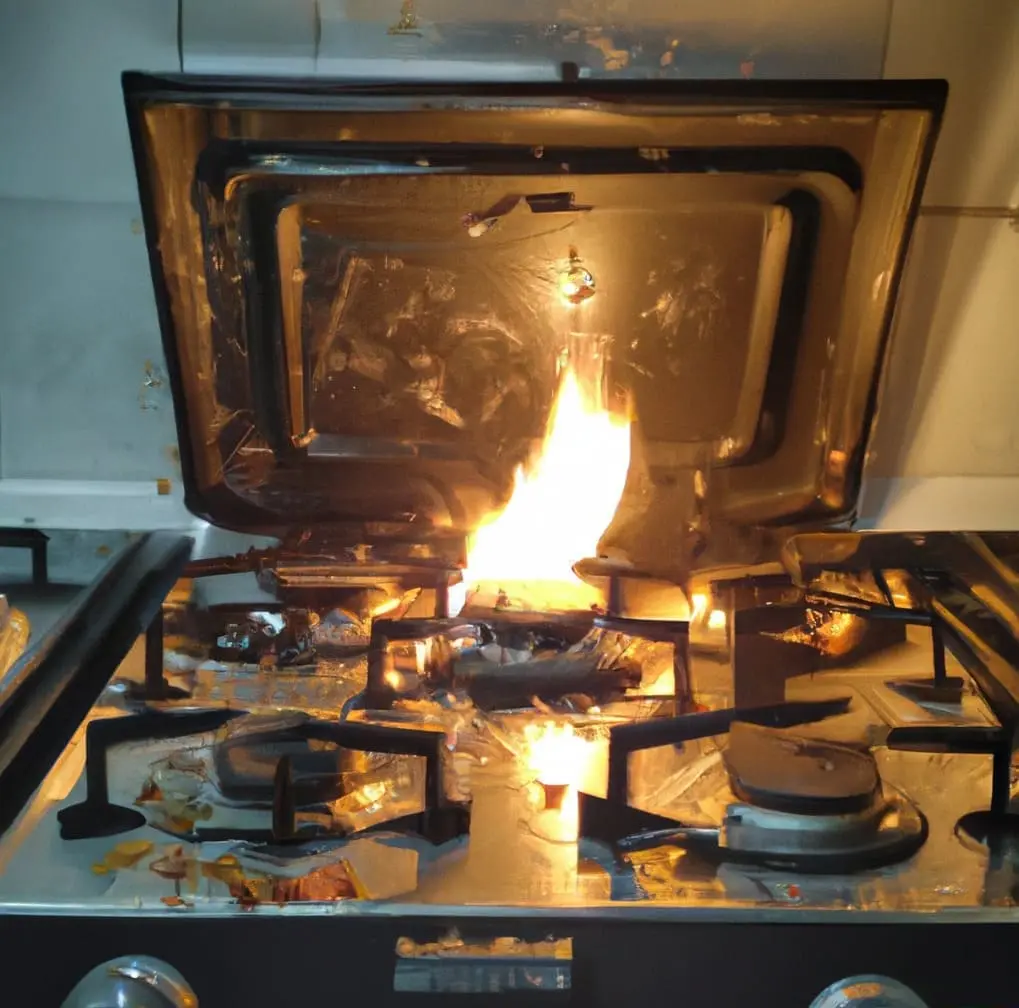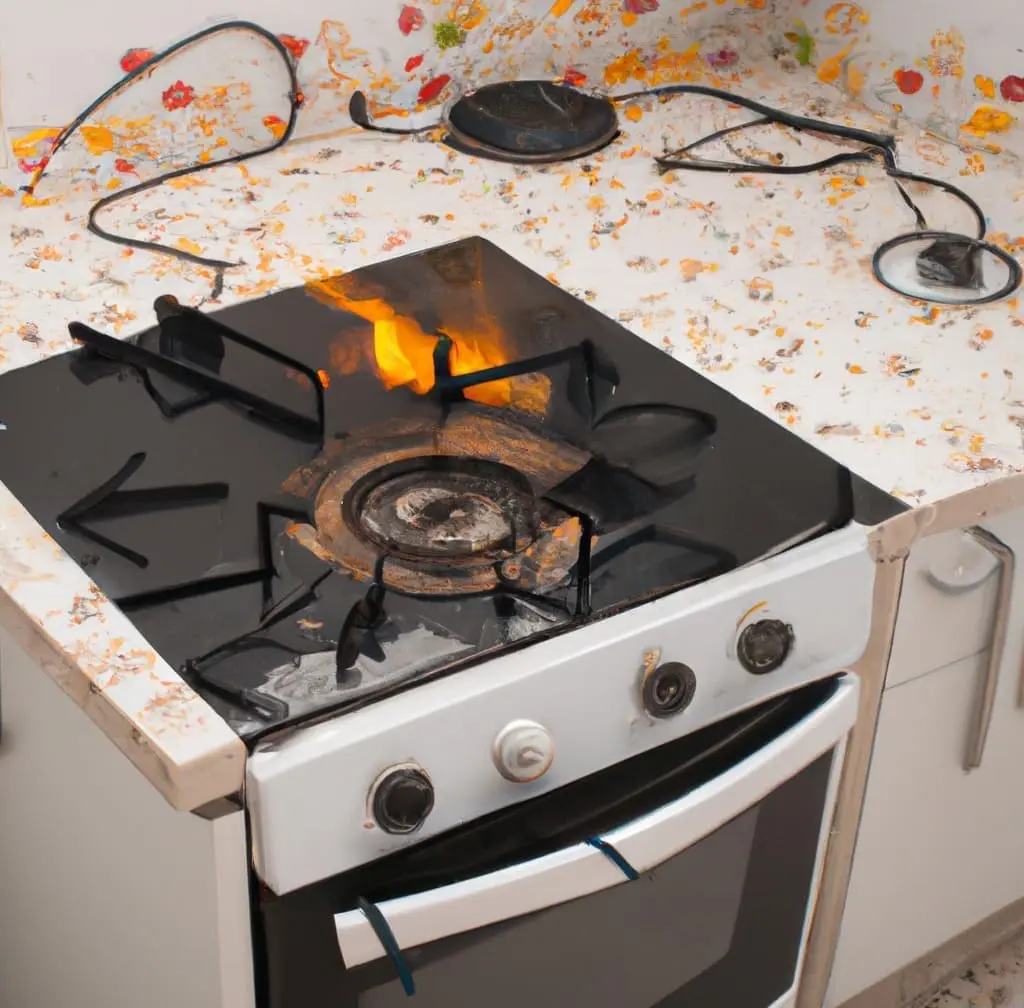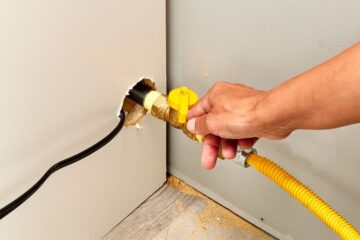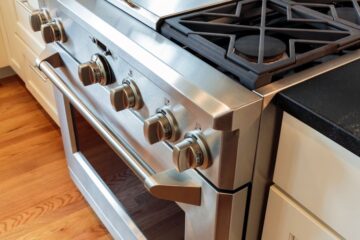Electric stoves have become a ubiquitous household item in many homes worldwide. They are a convenient and efficient way to cook food, but have you ever wondered can electric stoves explode? The idea of an electric stove exploding may seem far-fetched, but it’s a question that many people have asked. Shockingly, the answer is yes, electric stoves can explode!
While rare, an electric stove explosion can occur for several reasons, such as faulty wiring, damaged heating elements, or a gas buildup. The results can be catastrophic, ranging from property damage to severe injury or even death.
In this article, we will explore the various reasons why an electric stove can explode and provide tips on how to prevent it from happening. It’s essential to understand the potential dangers of an electric stove to ensure the safety of yourself and your loved ones. So, buckle up and prepare for a shocking revelation about electric stoves you never knew before!
Understanding Electric Stove Mechanics
Electric stoves use electrical energy to generate heat for cooking. The stove is connected to an electrical outlet, which supplies power to the stove’s heating elements. When you turn on a burner, an electric current flows through the heating element, which generates heat. The heat then transfers to the cookware placed on the burner, allowing food to be cooked.
The burner’s temperature can be controlled by adjusting the electrical energy supplied to the heating element. This is typically done using a control knob or digital display on the stove. As the electrical energy supplied to the heating element increases, the burner’s temperature increases, and vice versa.
Can Electric Stoves Explode?
Yes, electric stoves can potentially explode, although it is rare. Like any electrical appliance, electric stoves can malfunction or become damaged, resulting in a buildup of pressure or heat that can cause an explosion.
Additionally, certain types of cookware, such as glass or ceramic, can shatter under high heat, creating a dangerous situation. It’s essential to regularly inspect your electric stove and use it safely and correctly to minimize the risk of an explosion.
What Can Cause An Electric Stove To Explode?
Causes of Electric Stove Explosions:

There are several potential causes of electric stove explosions, including:
- Electrical malfunction: Electrical malfunctions within the stove can create a spark or cause the stove to overheat, leading to an explosion.
- Gas buildup: In some electric stoves, gas may ignite the burners. If there is a gas leak or buildup, this can lead to an explosion.
- Cookware failure: Certain types of cookware, such as glass or ceramic, may shatter if exposed to sudden high heat, which can cause an explosion.
- Improper use: Misusing the stove, such as leaving it unattended or using it in an area with poor ventilation, can increase the risk of an explosion.
- Manufacturing defects: In rare cases, a manufacturing defect in the stove may lead to an explosion.
Potential Dangers of Electric Stove Explosions
Electric stove explosions can be hazardous and lead to severe injuries or even death. The potential dangers of electric stove explosions include the following:
- Burns: The heat and flames from an electric stove explosion can cause severe burns to the skin and underlying tissue, which can require medical attention and may result in permanent scarring.
- Shrapnel injuries: If the explosion causes cookware or other stove parts to shatter, this can create sharp pieces of shrapnel that can cause severe injuries to those nearby.
- Smoke inhalation: Electric stove explosions may also release smoke or toxic fumes, which can be inhaled and lead to respiratory problems or asphyxiation.
- Fire: An electric stove explosion can also start a fire, quickly spreading to other parts of the home and causing extensive property damage or putting occupants at risk.
Preventing Electric Stove Explosions
Here are some tips for preventing electric stove explosions and adequately maintaining your electric stove:
- Regularly inspect your stove: Check your stove regularly for any signs of damage or wear, such as frayed wires or loose connections. If you notice anything unusual, stop using the stove immediately and have it inspected or repaired by a qualified technician.
- Follow manufacturer’s instructions: Always follow the manufacturer’s instructions for using and maintaining your electric stove, including using appropriate cookware and not leaving the stove unattended.
- Use appropriate cookware: Use cookware appropriate for use on electric stoves, and avoid using glass or ceramic cookware that may shatter under high heat.
- Keep the stove clean: Regularly clean your stove, including the burners and the area around the burners, to prevent the buildup of grease or other debris that can pose a fire hazard.
- Ensure proper ventilation: Ensure the area around your stove is well-ventilated to prevent the buildup of gas or fumes that can lead to an explosion.
- Hire a qualified technician for repairs: If your electric stove needs repairs, hire a qualified technician to do the job. Attempting to repair the stove yourself can be dangerous and may void any warranties.
What to Do if Your Electric Stove Explodes?
If your electric stove explodes, follow these steps:
- Turn off the power: Locate the circuit breaker or fuse box and turn off the power supply to your stove. This is important to prevent further damage or injury.
- Evacuate the area: Immediately evacuate around the stove, including any adjacent rooms. If the explosion has caused a fire, use a fire extinguisher to put it out or call the fire department.
- Ventilate the area: Open windows and doors to allow fresh air to circulate and dissipate any fumes the explosion may have produced.
- Call for help: Contact emergency services, including the fire department and paramedics, if necessary. Explain what happened and provide your location so they can quickly respond.
- Inspect for damage: After securing the situation, inspect the stove and the surrounding area for any damage or hazards. Please do not attempt to use the stove until it has been checked by a qualified professional.
What Happens If You Leave Electric Stove On?
Leaving an electric stove on for an extended period can be dangerous and can result in a fire. The extent of the danger will depend on various factors, including the temperature setting of the stove, the proximity of flammable objects to the stove, and how long the stove has been left on.
Suppose the stove is on at a low temperature. In that case, it may not be immediately dangerous. However, it can still waste energy and lead to a higher electricity bill. However, suppose the stove is left on at a high temperature or the maximum heat setting. In that case, the heat can cause the stove’s burners to overheat, and any flammable objects nearby may catch fire.
Furthermore, leaving an electric stove on while unattended or asleep risks carbon monoxide poisoning. This is because the stove’s burners consume oxygen and emit carbon monoxide, which can build up and cause illness or death.
Always monitor an electric stove when in use and turn it off when finished cooking. Additionally, ensure no flammable materials are near the stove while it is in use. Consider installing a smoke detector in the kitchen to alert you if a fire starts.
How Long Does It Take For An Electric Stove To Catch Fire?
The time it takes for an electric stove to catch fire can vary depending on various factors, including the type of stove, its age, condition, and usage. However, it is essential to note that electric stoves are generally less likely to catch fire than gas stoves, as they do not involve an open flame.
In some cases, an electric stove can catch fire in as little as 30 seconds if it is damaged, misused, or if flammable materials are present near the heating element. For example, if the heating element is covered or blocked, it can overheat and ignite nearby materials. Similarly, leaving cooking food unattended or using flammable cooking oils can increase the fire risk.
It is essential to use electric stoves safely, keep them clean and well-maintained, and follow manufacturer guidelines to minimize fire risk. Suppose you notice any issues with your electric stove, such as damage to the heating element or electrical wiring. In that case, it should be repaired or replaced immediately to prevent fire risk. Additionally, having smoke detectors and fire extinguishers in your home can help to mitigate the damage in the event of a fire.
- What Causes A Gas Stove To Explode? (Research Study)
- Left The Gas Stove On Without A Flame? (A Guide)
Do Electric Stoves Cause Cancer?
There is no evidence to suggest that electric stoves cause cancer. Electric stoves are generally considered safer and healthier than gas stoves because they do not produce harmful byproducts like carbon monoxide and nitrogen dioxide, which gas stoves can emit.
However, cooking at high temperatures can produce smoke and fumes that may contain harmful substances like polycyclic aromatic hydrocarbons (PAHs) and heterocyclic amines (HCAs), known to be carcinogenic. This is true for both gas and electric stoves.
To minimize the potential health risks associated with cooking, it is recommended to cook at lower temperatures, use the stove fan to reduce smoke and fumes, and avoid burning or charring the food. Maintaining good ventilation in the kitchen is also important to help reduce exposure to harmful substances.
Bottom Line
In the end, electric stoves are generally considered safer than gas stoves, but they are not without risks. Although rare, electric stoves can explode if not used or maintained correctly. The most common causes of electric stove explosions include faulty wiring, overheating, and using incompatible cookware.
However, with proper care and attention, these risks can be minimized. It is crucial to follow the manufacturer’s instructions, avoid overloading the stove, and regularly inspect and maintain the appliance. By doing so, you can enjoy the convenience and safety of cooking on an electric stove without shocking surprises.




